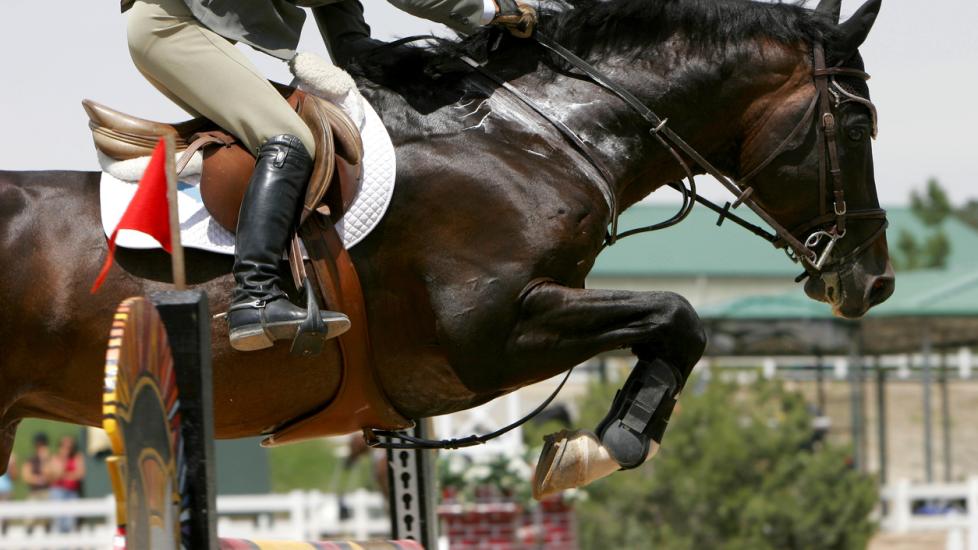Anhidrosis in Horses
What Is Anhidrosis in Horses?
Anhidrosis is the inability of a horse to sweat appropriately. It is also called “dry coat” or “non-sweaters,” and is commonly seen in hot, humid areas.
Symptoms of Anhidrosis in Horses
A horse may be experiencing anhidrosis if it exhibits any of the following signs:
-
Increased respiratory effort or “puffy” breathing, with little or no sweating
-
Prolonged fever over 105 degrees Fahrenheit after exercise
-
No sweating at all, even when sweating would be appropriate
-
Dry/flaky skin or areas of hair loss if the condition is chronic
-
Decreased thirst
-
Lethargy and exercise intolerance
Horses new to a hot environment may sweat excessively for a period of time before beginning to show signs. Incomplete anhidrosis occurs when some horses may still be able to sweat small amounts under the mane and saddle, or in the inguinal or perineal areas.
Causes of Anhidrosis in Horses
Anhidrosis is thought to be a disorder of the endocrine system; specifically, an overstimulation of certain sweat gland receptors. When exposed to the appropriate situations, this leads to non-responsive or decreased function.
Heat-stressed animals have higher levels of epinephrine (adrenaline) in their systems than other horses even at rest, stimulating the sweat glands more consistently and leading to desensitization of those receptors.
Sweat evaporation and respiration are the main methods horses use to cool down, which is why horses that can’t sweat experience increased respiratory rate and effort. Those horses are much more likely to struggle in hot, humid environments.
How Veterinarians Diagnose Anhidrosis in Horses
A diagnosis is often made based on a history of increased temperature for a longer period of time after a workout, an increased respiratory effort and rate, and poor performance or exercise intolerance.
A definitive diagnosis can be made with a set of injections down the neck below the mane. Normal horses will sweat at all or most injection sites, whereas anhidrotic horses will show very little diminished sweat at the site. Injection testing is rarely used in the field, as clinical signs and history often lead to the appropriate diagnosis.
Treatment of Anhidrosis in Horses
In an emergency situation of prolonged or extremely elevated body temperature, and an increased respiratory rate/effort, it is important to wash off the horse with cool water, then douse it with isopropyl alcohol while you wait for your veterinarian to arrive.
Supplement anhidrotic horses with daily electrolytes, particularly potassium salts. Some horses may benefit from short-term vitamin E or iodinated casein treatment regimens. Tyrosine supplementation can help re-sensitize sweat gland receptors.
Another treatment for anhidrosis includes acupuncture with herbal therapy. Dark beer given once a day may benefit horses suffering from more mild cases of incomplete anhidrosis: “A Guinness a day keeps the doctor away!”
Management of Anhidrosis in Horses
Move horses to a cooler environment (northern states that do not exhibit such harsh hot, humid summers). If that’s not possible, horses should be kept in a stall with good air movement, a fan or misters during the hottest parts of the day, and and their exercise programs should be adjusted to morning and evenings.
Cool off horses well after each exercise session. Offer plenty of cool water 24/7, and supplement with electrolytes. Anhidrotic horses are going to be prone to poor performance, so manage athletic expectations. Avoid medications such as clenbuterol that also acts upon desensitized sweat receptors.
Anhidrosis in Horses FAQs
Is anhidrosis curable?
Horses with decreased function or desensitization of the sweat glands will always need to be managed appropriately to avoid respiratory distress and heat stroke.
What do you feed a horse with anhidrosis?
Less concentrates and lower protein may be an approach for some, although diet influence on non-sweating is still controversial.
What type of beer is best for horses?
The darker, the better! Veterinarians typically recommend Guinness.
Featured Image: iStock.com/LincolnRogers
